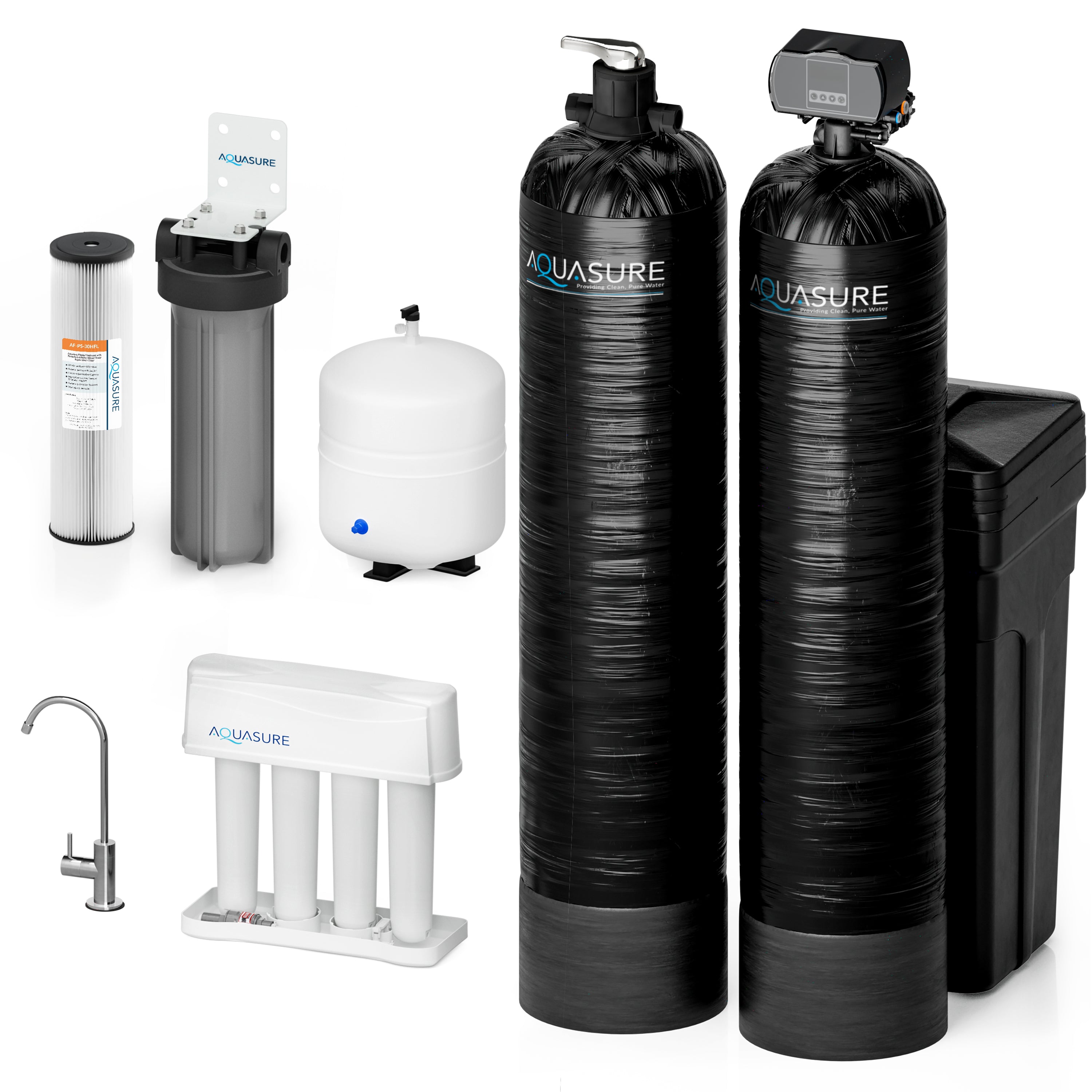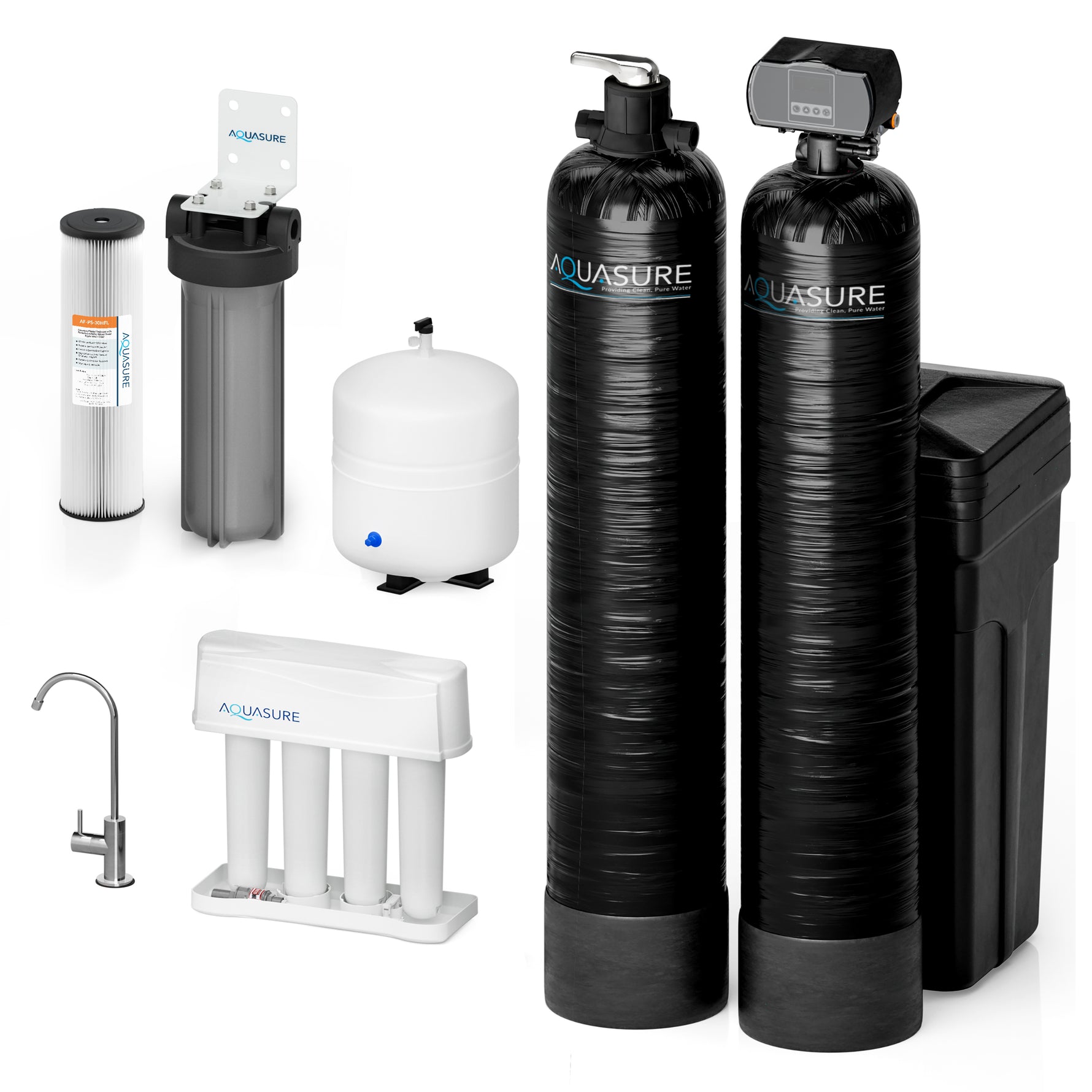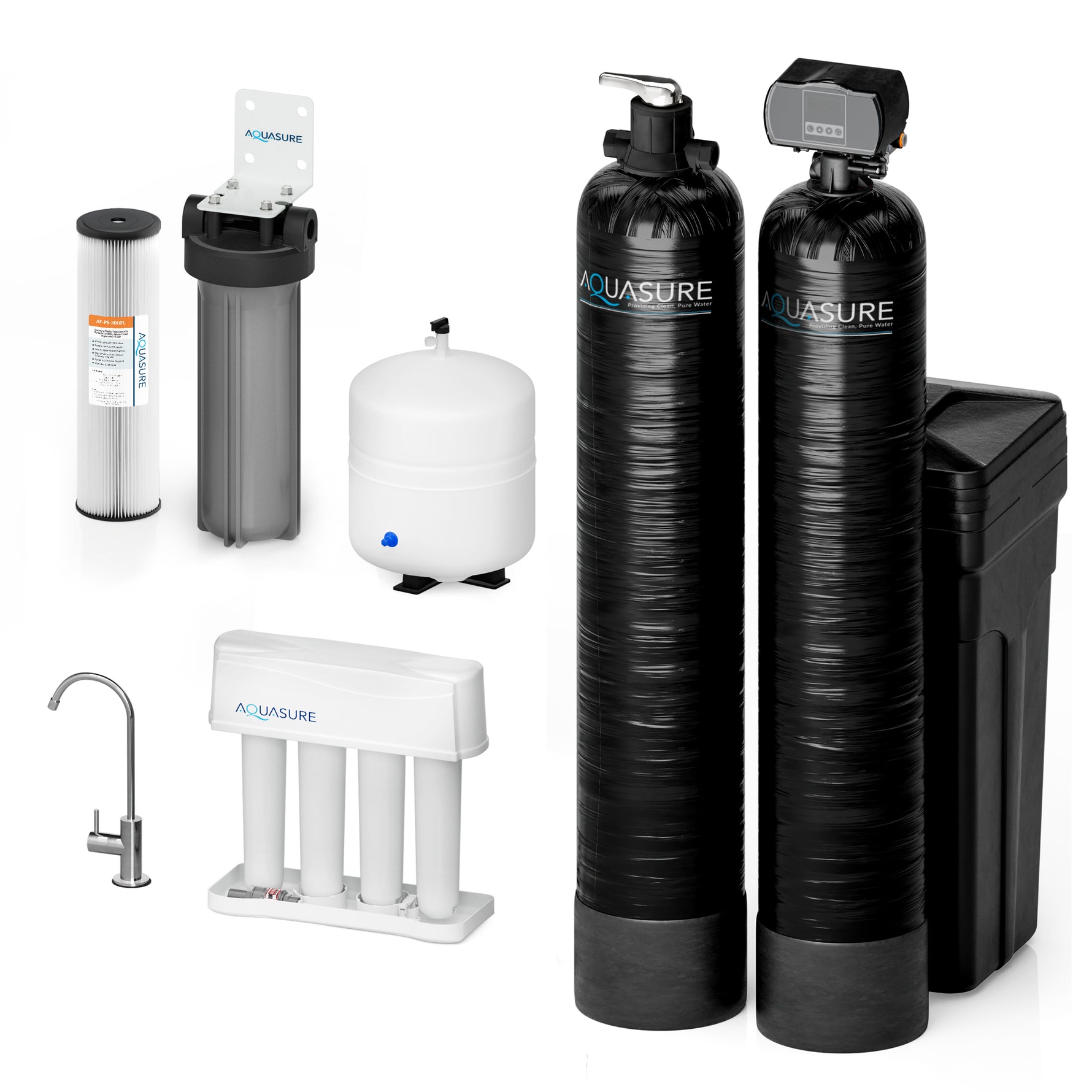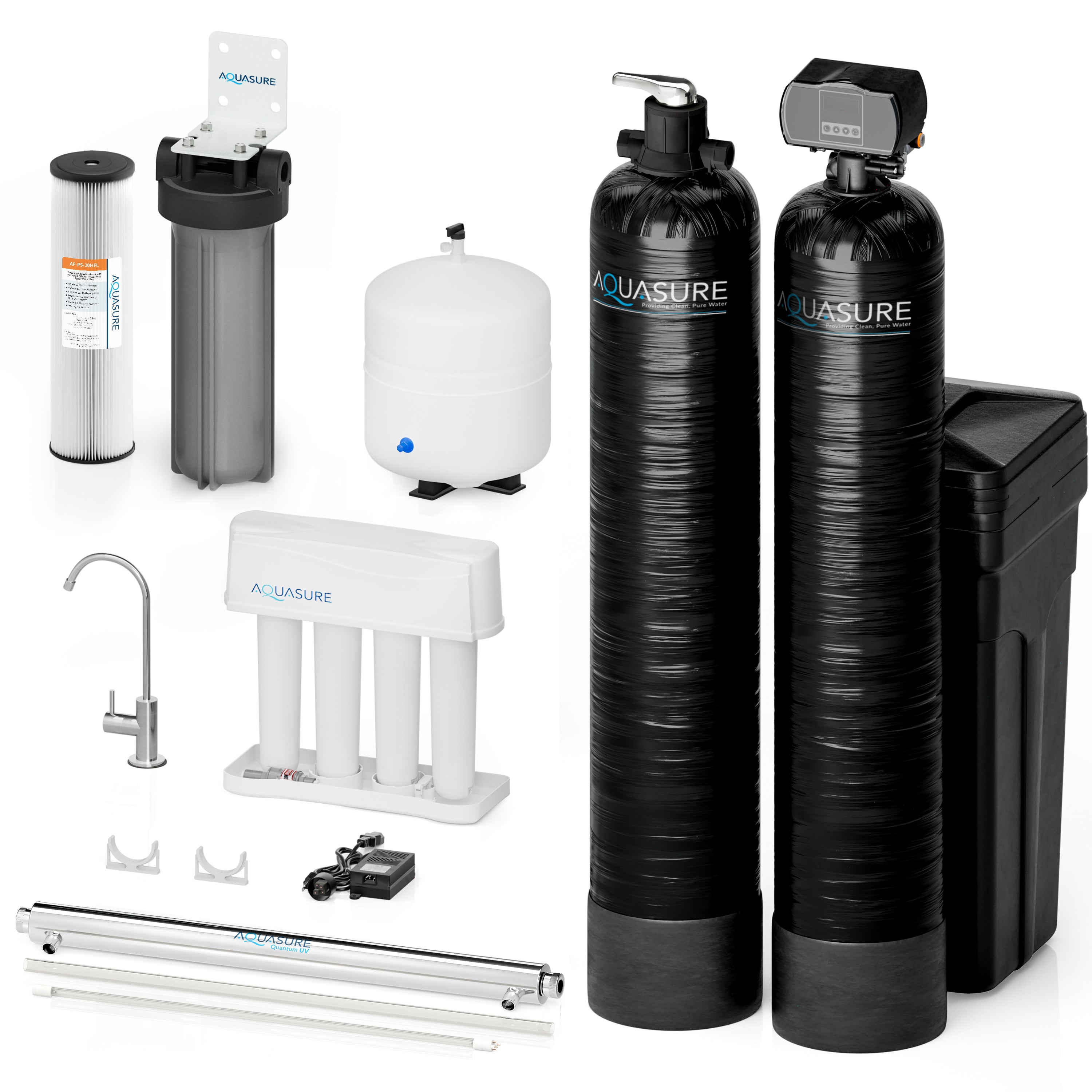Common Water Heater Problems and How Water Treatment Systems Help
Water heaters make life easier, providing hot water for our showers, dishes, and laundry. But like any home appliance, they can run into problems that disrupt our routines and hit our wallets hard.
Let's dive into the most common water heater problems and their solutions. We'll also explore how water treatment systems can prevent these issues, saving you both money and stress over time.
1. Water Heater Isn’t Heating Water
Why It Happens and How to Fix It
It’s a chilly morning, and you step into the shower, only to be greeted by cold water that never heats up. Before settling for a week of cold showers, here’s what might be going wrong:
- Thermostat Troubles: If your home’s water is running cold, the thermostat might be to blame. Check its settings first. If everything seems correct but your shower is still an icy affair, replacing the thermostat could be your next step. It’s usually not too difficult; turn off the power, open the heater panel, and switch out the thermostat.
- Broken Heating Element: In electric heaters, heating elements can wear out. Shut off the power, drain the tank, and replace the element. This fix can restore your hot showers quickly.
- Pilot Light Issues: For gas heaters, a pilot light that won’t stay lit could be the culprit. Try relighting it following the instructions from your heater’s manual. If it goes out again, you might need to replace the thermocouple, which involves turning off the gas and swapping out the part.

How Water Softening Systems Help
Hard water is a real troublemaker, leaving behind a limescale that can seriously mess with your water heater’s performance. This buildup is especially bad news for the heating elements and can even affect gas heaters by interfering with the pilot light. Installing a water softener cuts down on these harsh minerals, keeping your heater running smoothly and extending its life.
Picture this: You've set your thermostat correctly, but your water is still cold. When you take a closer look, you find a thick layer of limescale coating the heating element. This is a common problem in areas with hard water, where minerals like calcium and magnesium act as insulators, stopping the heating element from warming the water properly. For gas heaters, limescale can also accumulate around the pilot light, causing ignition problems.
By installing a water softener, you reduce these minerals in your water, preventing limescale buildup. This keeps your heating elements and pilot light working efficiently. Not only does this maintain your water heater in top shape, but it also boosts the performance of other appliances in your home.
2. Hot Water Smells Bad
Why It Happens and How to Fix It
There’s nothing worse than a foul-smelling hot shower. If your hot water smells off, here’s what might be happening:
- Anode Rod Issues: This rod protects your tank from rust but can create a sulfur smell as it deteriorates. Replacing the anode rod involves draining some water from the tank, then swapping out the rod.
- Chemical Smell: If your hot water has a strong chlorine or chemical odor, it could be due to the chemicals used in municipal water treatment reacting with the minerals in hard water. This smell often becomes more noticeable when the water is heated. Installing a water softening system can help reduce these minerals, which in turn can minimize the chemical reactions causing the unpleasant smell. This not only improves the smell and taste of your hot water but also makes it safer and more pleasant for everyday use.
How Aquasure Fortitude PRO and V2 Systems Help
When your water starts smelling a bit off, it's not just an annoyance—it could be a warning sign of harmful contaminants. Luckily, cutting-edge solutions like the Aquasure Fortitude Pro and V2 Systems are here to help ensure your water stays safe and pleasant.
With the Aquasure Fortitude Pro and V2 Systems, you tackle the issue of foul-smelling water comprehensively. This dynamic duo ensures your water is not just clean but also free from health risks, bringing you peace of mind with every turn of the faucet.
3. Limescale Build-Up in Water Heater

Why It Happens and How to Fix It
Limescale in your water heater can make it less efficient and damage other appliances too. Here’s how you can handle it:
- Reduce Efficiency: Limescale acts like an insulator, making your heater use more energy.
- Clog Pipes: Severe build-up can block water flow.
Fix and Prevent it By:
Flushing the Tank: Like any appliance, your water heater benefits from a little TLC. Periodic flushing can remove limescale and sediment, improving efficiency.
Installing a Water Softener: Preventing hard water from entering your heater in the first place can reduce limescale buildup significantly.
Using a Whole House Water Filtration System: Think of this system as a guardian for your home’s water supply. It starts cleaning your water the moment it enters your home, filtering out minerals and other impurities at the entry point. Doing this greatly prevents limescale from ever reaching your pipes and appliances. What do you get in return? Assurance that every drop of water in your home is cleaner, softer, and better for everything it touches. Not only does this help keep your water heater in top shape by reducing limescale, but it also boosts the efficiency and longevity of all your water-using appliances.
View Our Signature Series Collection
|
Product Type |
Product Name | Key Features | Ideal For | Property Size | Product Link |
|---|---|---|---|---|---|
| Whole House Treatment | Signature Elite | 1,000,000 Gallons Whole House Water Filter Treatment Bundle with 48,000 Grains Softener, 75 GPD Reverse Osmosis System | Comprehensive water treatment bundle with softener, filter, and RO system | Large homes | |
| Whole House Treatment | Signature Elite | 600,000 Gallons Whole House Water Filter Treatment Bundle with 32,000 Grains Softener, 75 GPD Reverse Osmosis System | Complete water treatment solution with softener, filter, and RO system | Medium homes |
SKU: AS-
SE600A |
| Whole House Treatment | Signature Elite | Whole House Water Treatment System with Fine Mesh Resin and KDF85 Carbon Media and 12 GPM Quantum UV deactivator System | Advanced filtration and UV disinfection for superior water quality | All |
SKU: AS-SE1000FMU
|
How Water Treatment Systems Help
Water treatment systems, including water softeners and whole house filters, tackle the core issues that affect your water heater. By softening hard water and filtering out contaminants, these systems prevent the formation of limescale, a key culprit in reducing heater efficiency. Over time, without these systems, mineral deposits can form on the heating elements and inside the tank, forcing your heater to work harder and use more energy. Regular tank flushing can help, but it's the combination of a water softener and a whole house filter that truly gets to the heart of the problem.
This approach not only boosts your water heater's performance but also prolongs its life, ultimately saving you money on energy costs and future appliance replacements.
4. Water Heater is Leaking
Why It Happens and How to Fix It
A leaking water heater can quickly turn into a major headache if it's not dealt with promptly. Here's what usually causes leaks and how you can fix them:
- Corrosion: Water heaters can rust which leads to leaks. If you notice rust or water around your heater, it may be time to replace it. Replacing a water heater involves shutting off the water and gas, removing the old tank, and installing a new one—a necessary step to prevent damage, but a costly one.
- Loose Connections: Hopefully, this is the issue. If you simply regularly check and tighten your water heater's connections, all this will cost is a wrench and some elbow grease. A quick tightening of any loose fittings can often stop a leak before it becomes a bigger problem.

How Water Treatment Systems Protect Your Water Heater
Keeping your water heater in top shape is all about preventing corrosion, and that's where water treatment systems come into play. These systems, including both water softeners and whole house filters, tackle the culprits behind rust and leaks. By filtering out harsh minerals and impurities, they help ensure your water heater stays leak-free and efficient.
This is how water softeners and whole house water filters prove their worth. By removing those corrosive elements from your water before they ever reach your heater, they extend the life of your appliances. Not only does this prevent frustrating leaks, but it also saves you a bundle on potential repairs and replacements down the line. Investing in a good water treatment system isn't just a smart choice—it's a move that keeps paying off in place of you paying out.
5. Water is Too Hot or Cold
Why It Happens and How to Fix It
Having a Goldilocks moment, constantly finding your water too hot, too cold, but never just right? Inconsistent water temperatures can be more than just annoying. Here are a few potential culprits behind these frustrating fluctuations:
- Thermostat Settings: Make sure your thermostat is set to a safe yet comfortable temperature, usually around 120°F (49°C). If adjusting doesn’t help, replacing the thermostat might.
- Sediment Build-Up: Sediment at the bottom of the tank can insulate water from the heaters, leading to temperature issues. Flushing the tank regularly can help.
How Water Treatment Systems Help
Clean water means less sediment and fewer mineral deposits, ensuring consistent heating and a longer-lasting water heater. Water softeners and whole house water filtration systems ensure that clean water enters your heater, making it “just right”.
Frequently Asked Questions
How can water treatment systems prevent water heater problems?
Water treatment systems help keep your water heater running smoothly by filtering out the stuff that causes problems like limescale, rust, and buildup from other impurities. By getting rid of these pesky minerals and contaminants, these systems not only help your water heater last longer but also ensure it works efficiently every time you need hot water.
Why is water quality important for my water heater?
Good water quality is key because when water quality drops, it can cause all sorts of headaches like limescale, rust, and build-up from impurities in your water heater. These problems can make your heater less efficient and shorten its life. Using a water treatment system helps avoid these issues, keeping your water heater in top shape and working well.
What common water heater problems can water treatment systems help mitigate?
Water treatment systems are real lifesavers when it comes to keeping your water heater free from limescale, rust, funky smells, and unpredictable temperatures. They work by cleaning up your water right from the start, stripping out the bad stuff before it even hits your heater. This means your heater runs smoother and lasts longer, saving you from hassle and extra costs down the road.
How often should I maintain my water heater to avoid problems?
Regular maintenance is crucial for keeping your water heater in great condition. Aim to flush the tank and check its anode rod at least once a year. This helps prevent the buildup of sediments and corrosion, ensuring that your heater operates efficiently and extends its lifespan. A well-maintained water heater is less likely to have issues like temperature fluctuations or leaks.
Can installing a water treatment system reduce my energy bills?
Absolutely! By preventing scale and buildup inside your water heater, water treatment systems allow it to heat water more efficiently. When your heater doesn't have to work as hard to achieve the desired temperature, it uses less energy, which can lead to lower monthly energy bills. Plus, with less strain on the system, you can avoid costly repairs and enjoy hot water without the worry of unexpected expenses.
Conclusion
Keeping your water heater in tip-top shape is key to ensuring you always have reliable hot water at your fingertips. By tackling common issues head-on and integrating water treatment systems, you can greatly extend your heater's lifespan and enhance its performance. This not only guarantees you steady hot water but also leads to noticeable savings. More efficient water heaters mean lower energy bills, and by staving off limescale and corrosion, you'll cut down on costly repairs and replacements. Plus, a well-maintained water heater helps protect other home appliances from the damaging effects of hard water, multiplying your savings over time.
Want to know more about how water treatment systems can boost your water heater's efficiency and reliability? Visit our website today to learn more and start saving on energy costs while keeping your appliances running smoothly for years to come.









